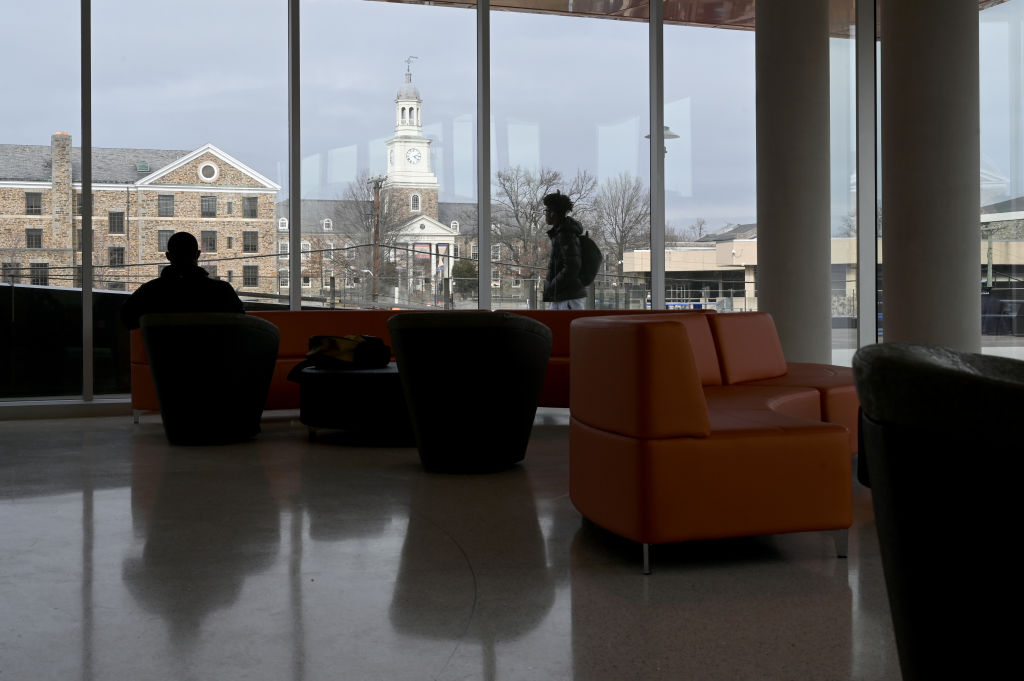Where HBCU Alum Work: Top Cities For Black College Grads To Find Jobs
Not The Northeast: Top Cities For HBCU Graduates To Find Jobs

Tyler Hall which houses student services at Morgan State University opened during the pandemic and looks out over Holmes Hall and other buildings on campus on February 7, 2022, in Baltimore. | Source: The Washington Post / Getty
For far too many Black college graduates, finding employment after school can be an extremely difficult task.
Locating an opportunity that fulfills all of one’s needs can be arduous, to say the least, especially for those who graduated from a historically Black college or university (HBCU) and are looking to maintain access to Black camaraderie in their next endeavor post-college.
However, new data from LinkedIn could potentially make this obstacle a little easier to manage for HBCU alums, in particular.
“For Black graduates, we knew that graduation season would be even more stressful,” said LinkedIn Career Expert & Morehouse alum, Drew McCaskill. “We systematically face higher unemployment rates, we have access to fewer job opportunities for a lot of reasons, we are oftentimes paid less, and face higher levels of job instability, not to mention most Black graduates can expect to pay more per month in student loan payments.”
McCaskill continued: “We needed to double click on Black professionals and Black graduates to figure out how we can give them information based on what we know at LinkedIn to help them navigate this incredibly tough time.”
Last month, the popular professional networking site released data on the top cities where Generation Z graduates can find entry-level jobs. This data was then cross-referenced with places where high levels of HBCU graduates and Hispanic Serving Institutions (HSI) graduates happened to reside.
Let’s take a look at the top ten cities for HBCU and HSI graduates to find entry-level employment, according to LinkedIn.
Austin, Texas
Nationwide Ranking: #1 fastest growing location for entry-level jobs nationwide. The city is home to one HBCU and the state of Texas holds 10 historically black institutions. Austin also holds three HSIs.
Top Industries: Technology and Information, IT Services and IT Consulting, Real Estate, Computers, and Electronics Manufacturing, Transportation Equipment Manufacturing
Raleigh-Durham-Chapel Hill, North Carolina
Nationwide Ranking: #3 fastest growing location for entry-level jobs nationwide. This area is home to six different HBCUs and the state of North Carolina has 11 HBCUs in total.
Top Industries: Technology and Information, IT Services and IT Consulting, Chemical Manufacturing, Real Estate, Research Services
Charlotte, North Carolina
Nationwide Ranking: #4 fastest growing location for entry-level jobs nationwide. There are three HBCUs currently in the Charlotte area. In addition, the state of North Carolina holds the most HBCU students in the country.
Top Industries: Technology and Information, IT Services and IT Consulting, Real Estate, Food, and Beverage Services, Insurance
Nashville, Tennessee
Nationwide Ranking: #7 fastest growing location for entry-level jobs nationwide. There are four HBCUs in Nashville and seven total in the state of Tennessee.
Top Industries: Real Estate, IT Services, and IT Consulting, Technology and Information, Food and Beverage Services, Medical Practices
San Diego
Nationwide Ranking: #8 fastest growing location for entry-level jobs nationwide. There are four HSIs in the city of San Diego.
Top Industries: Technology and Information, Research Services, IT Services, and IT Consulting, Transportation Equipment Manufacturing, Military, and International Affairs
Chicago
Nationwide Ranking: #16 fastest growing location for entry-level jobs nationwide. Chicago is home to one HBCU and nine HSIs.
Top Industries: IT Services and IT Consulting, Technology and Information, Real Estate, Food and Beverage Services, Advertising Services
Dallas
Nationwide Ranking: #18 fastest growing location for entry-level jobs nationwide. Dallas is currently home to four HBCUs and the state of Texas has a strong HBCU presence. Dallas also holds one HSI.
Top Industries: IT Services and IT Consulting, Real Estate, Technology and Information, Transportation Equipment Manufacturing, Insurance
Atlanta
Nationwide Ranking: #24 fastest growing location for entry-level jobs nationwide. There are 6 HBCUs in Atlanta and the state of Georgia holds ten HBCUs.
Top Industries: IT Services and IT Consulting, Real Estate, Technology and Information, Food and Beverage Services, Transportation Equipment Manufacturing
Houston
Nationwide Ranking: #25 fastest growing location for entry-level jobs nationwide. Houston has two HBCUs and a large Black population. There are also eight HSIs in Houston.
Top Industries: Real Estate, Oil and Gas, IT Services and IT Consulting, Technology and Information, Medical Practices
Orlando, Florida
Nationwide Ranking: #26 fastest growing location for entry-level jobs nationwide. Florida is home to 4 HBCUs and Orlando has 4 HSIs.
Top Industries: Real Estate, Technology and Information, IT Services and IT Consulting, Transportation Equipment Manufacturing, Hospitality
Data like this helps point many Black people in the right direction when in search of employment. However, there is still a long way to go in bridging the opportunity gap for Black people.
HBCUs and their alums are in a unique position to be able to help rectify some of these ills through networking and information sharing.
“People who have experience need to share their experiences liberally, people who are inexperienced or who are early in their career need to identify their own personal board of directors,” McCaskill added. “Some of those will be mentors but some of those will be peer to peer mentorship. You’d be shocked at how much you can learn just by having candid conversations with a trusted peer.”
The importance of networking within our communities and beyond cannot be overstated. To bridge the opportunity gap, it’s going to take a strong effort from both our community and companies in corporate America emphasizing Black advancement to provide the solution to this issue.
“The experience of professionals of color is markedly different from our non-Hispanic white counterparts,” said McCaskill. “Let’s have a hard conversation but let’s do it in a way so that we can give people better information.”
SEE ALSO:
Promising Job Market Greets Black College Graduates As Unemployment Rate Reaches Pre-Pandemic Levels
Ranking HBCUs With The Highest Financial Benefits For Black College Grads

















